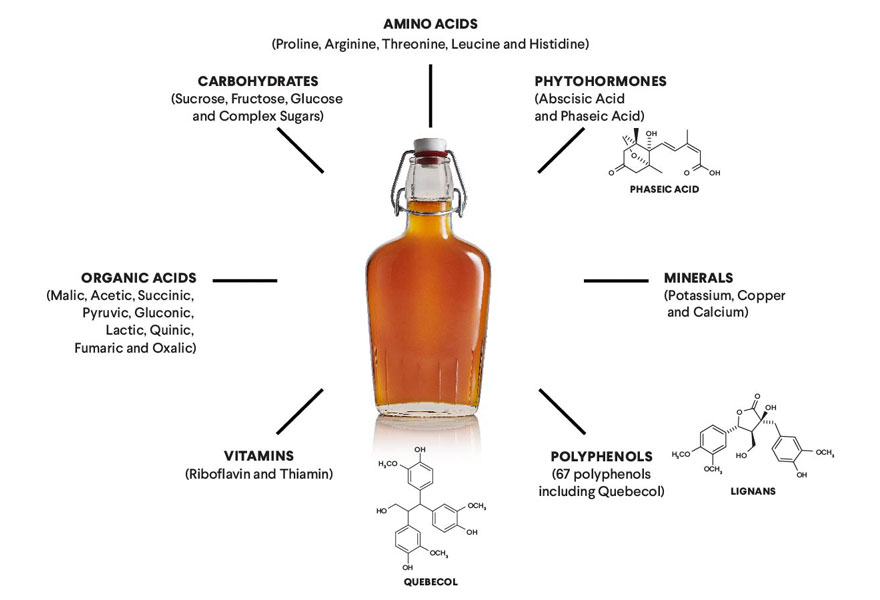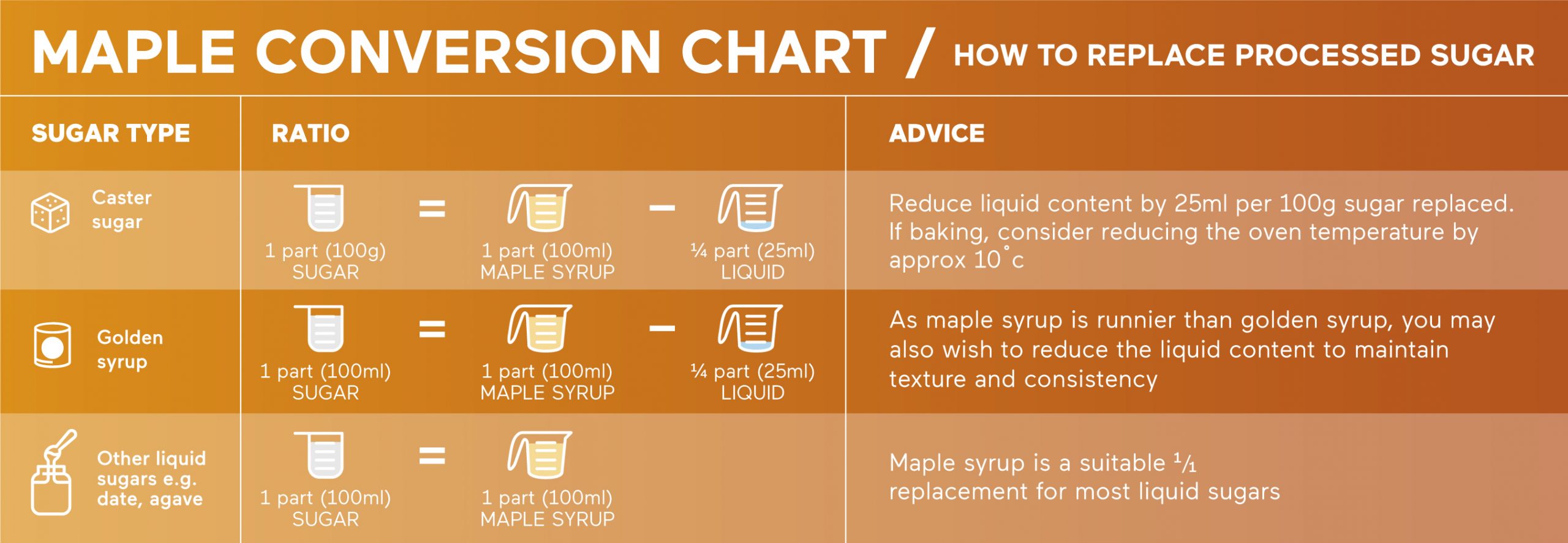Is Maple Syrup Healthy?
A SWEETENER FULL OF SURPRISES
More than just a delicious sweetener or source of energy, pure maple syrup contains vitamins and minerals like riboflavin and manganese that contribute to the healthy functioning of the body. As an entirely natural ingredient, it’s also free from artificial additives and is completely vegan.
However, being a sweetener, you’re still likely to ask, “is maple syrup healthy?”. Below, we dig deep into this question and examine the potential impact of consuming maple syrup as part of your diet.
Maple syrup nutrition
Maple syrup contains over 100 compounds, vitamins and minerals. Among these substances, it is known for being especially rich in riboflavin (vitamin B12) and manganese. Just a two-tablespoon serving (30ml) of maple syrup contains around:
- 0.18mg riboflavin, which is roughly 14% of the daily recommended intake of the vitamin;
- 0.83mg manganese, which is roughly 36% of the daily recommended intake of the mineral.
Manganese has a number of potential health benefits, such as supporting metabolism, reducing inflammation and regulating blood sugar levels, while riboflavin has been found to reduce tiredness and prevent cell damage.
As well as being naturally rich in manganese and riboflavin, pure maple syrup also contains traces of iron, copper, calcium, potassium and magnesium, as well as vitamins B2, B5 and B6, all of which contribute to a healthy lifestyle.

Maple syrup research
Made solely from the sap of the maple tree, maple syrup has garnered a lot of attention over the years as a potential superfood. For years, researchers have sought to substantiate these claims, building up a large body of research into the properties of maple syrup in the process
Research into the potential health benefits of maple syrup
We know today that maple syrup contains 67 different polyphenols, nine of which are unique to the ingredient. Various studies have been conducted into these substances, with one finding the polyphenolic extract in maple sap to contain antioxidant properties.
Among the polyphenols unique to maple syrup, Quebecol, named after the Canadian province in which most maple syrup is produced, has aroused the most interest. One study suggests the polyphenolic compound helps alleviate periodontal tissue damage.
Further research is needed to verify the antioxidant properties of maple syrup, though there is evidence to suggest the darker grades of the sweetener have stronger antioxidant effects than the lighter grades.
In addition to the research into the polyphenolic properties of maple syrup, one study has found that the ingredient contains inulin, a type of dietary fibre linked to a number of health benefits including improved digestion and the regulation of blood sugar levels.
Research into the effects of replacing sugar with maple syrup
Most early research into maple syrup’s potential health benefits lacks practical application to human health. However, the first studies involving human participants are now helping to shed light on the lived impact of consuming maple syrup as part of your diet.
In 2023, a groundbreaking study into the effects of substituting refined sugar with an equivalent amount of maple syrup found that the latter is likely to be better for cardiometabolic health.
The clinical trial saw two groups of adults classified as overweight consume either one 30ml serving of maple syrup or flavoured sucrose syrup per day, corresponding to 5% of the total daily energy intake from added sugars.
Over an eight-week period, those in the group that consumed maple syrup experienced:
- A reduction in abdominal fat
- Decreased systolic blood pressure
- Improved glycaemic response
- A reduction of certain bacteria
The results of the study indicate that maple syrup is better than refined sugars in limiting certain cardiometabolic risk factors.

Learn more about the nutritional profile of maple syrup relative to other popular sweeteners like honey and golden syrup by following the links below.
So, is maple syrup good for you?
As with all sweeteners, maple syrup is high in sucrose, and should therefore be enjoyed only in moderation. However, the research suggests that maple syrup may be a healthier alternative to processed sweeteners like sugar, due to its higher content of vitamins, minerals and polyphenols.
Not only that, but maple syrup also has fewer calories and a lower glycaemic index than many other natural sweeteners like honey, which means it contributes to less excess body fat and raises blood sugar levels more slowly.
Maple syrup, along with other maple products like maple sugar and maple spread, can therefore be used to replace other sugars and syrups while cooking and baking, while also offering a healthier alternative to commercial sports drinks and snacks that are often heavily processed.
Ultimately, you should seek to limit your consumption of high-sucrose sweeteners, however if you are to pick one, you can rely on maple products as the natural choice.
A natural source of energy
Maple syrup is a natural source of energy. Check out our recipes for food and drinks before, during, and after exercise.
)